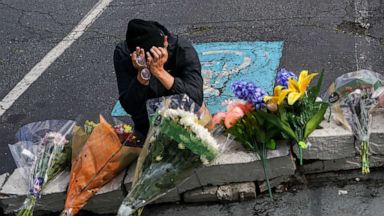
On Monday, 10 people were killed at a grocery store in Boulder, Colorado. This event follows the deaths of eight people, including six Asian woman, in shootings at Atlanta spas last week. In 2021 alone, there have been 102 mass shootings, according to the Gun Policy Archive, with 4,123 total deaths due to gun violence.
- Boulder shooting: Gunman kills 10 at King Soopers grocery store
- Official: Colorado shooting suspect prone to rage, delusions
“When there’s something about the case that resonates with you and that you identify with, it’s going to have a pretty significant impact,” said Dr. Ronald Acierno, professor of psychiatry and behavioral sciences at UTHealth’s McGovern Medical School. “In this case, it was in a store where everybody goes. It’s such a common daily activity that’s so much a part of us that it’s particularly frightening for people.”

Post-traumatic stress disorder (PTSD), general anxiety, depression and substance abuse are four of the main conditions that can develop because of trauma, especially in those who personally witness a traumatic event, according to Acierno, who is also the director of the Trauma and Resilience Center at UTHealth, where they provide specialized counseling for all forms of trauma, ranging from accidents to violence.
“And that’s only when you give it a name,” he noted, adding that people may develop symptoms that do not necessarily meet the threshold for a disorder diagnosis.
The American Psychiatric Association (APA) outlines common reactions following a disaster, including changes in sleep, mood changes, decreased energy, changes in appetite, problems concentrating, headaches or other body pains and increased isolation. Children can also be affected, developing issues such as temper tantrums, getting into more fights or having trouble with schoolwork.
These conditions have already been amplified by the COVID-19 pandemic, according to Dr. Louis Kraus, the chief of child and adolescent psychiatry at Rush University Medical Center.
The APA surveyed American adults in February, and many reported that since the pandemic started, they have had undesired weight changes, are drinking more alcohol to cope with stress and are not getting their desired amount of sleep. This is particularly true of parents, essential workers, young people and people of color.
These reported health impacts signal many adults may be having difficulties managing stressors, including grief and trauma, and are likely to lead to significant, long-term individual and societal consequences, including chronic illness and additional strain on the nation’s health care system.
“There is already such a high level of anxiety and tension with social distancing and people not being able to partake in their normal routines,” noted Dr. Paulina Riess, ethics chair and clinical assistant professor in the psychiatry department at NYU Grossman School of Medicine.

Kraus stressed that those who are affected need to reach out and get help.
“One of the most important things that people need to realize is that they need to get back to a normal lifestyle,” he said. “The longer you hold off doing that and wait it out, the harder it will be.”
Dr. Jeffrey Geller, president of the APA, agreed, saying, “If you are hurting, reach out.”
The providers all note that mental health professionals are an important part of getting better.
“Family and community are really important in these situations, but they’re sometimes not enough,” Kraus said.
By DR. SAMUEL ROTHMAN and DR. TARUN JAIN
SOURCE: YAHOO NEWS




